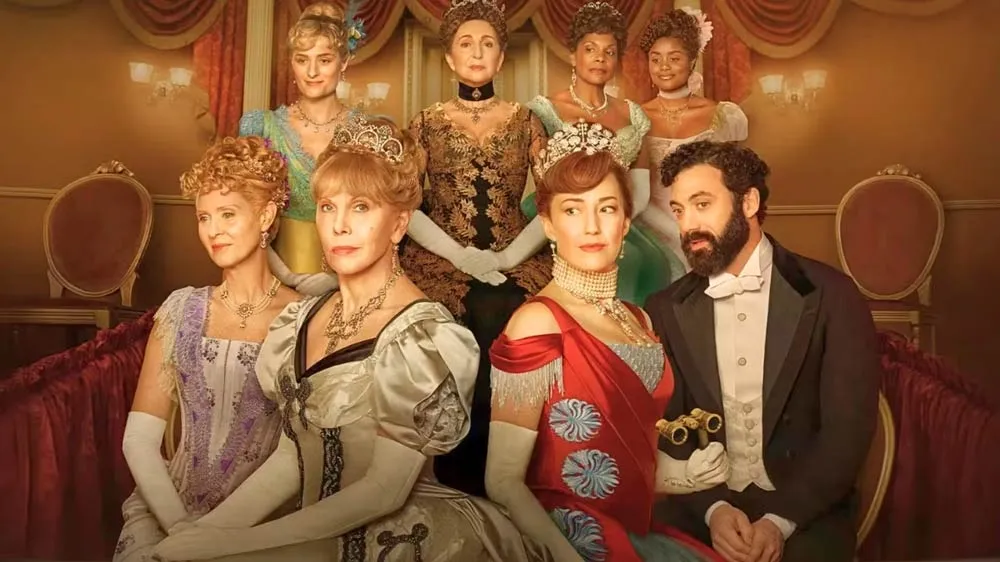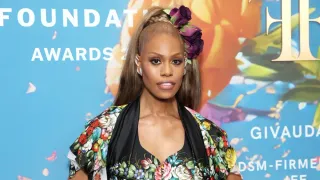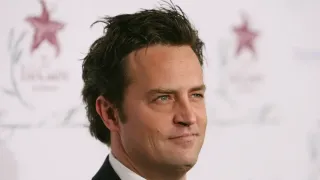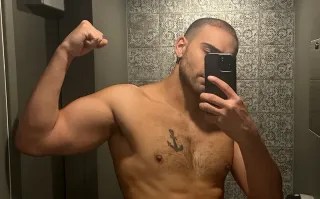November 16, 2020
Talking with Tania Cypriano about 'Born to Be' - Her Doc about Gender Affirming Surgeries
Kilian Melloy READ TIME: 17 MIN.
Tania Cypriano's documentary "Born to Be," arrives in virtual cinemas on Wednesday as part of Transgender Awareness Week.
"Born to Be" is available in virtual cinemas on Kino Marquee starting Nov. 18.
If you're worried by the fact that the film is about the Mount Sinai's Center for Transgender Medicine and Surgery in New York City and focuses on patients receiving surgical procedures – everything from facial feminization to phalloplasties and vaginoplasties – don't be. This is a portrait not of mangled flesh, but of healing spirits, and it's an uplifting experience despite the pain it documents.
That pain, of course, is experienced mainly by the Center's patients, some of whom have resorted in years past to less than top-of-the-line medical care. Then, too, the surgical aspects of transitioning involve physical pain and discomfort; sometimes bones are cut and re-shaped, or skin grafts are taken from large areas of the body, and these are major procedures that require time and – especially for those yearning to find themselves in a new, more appropriate body – patience.
But pain also registers from people close to the patients, at least in some cases, as with a young woman named Devin, whose mother is supportive and yet, at the same time, distraught. (Others, such a Jordan, have happier supportive family members; Jordan's progress is celebrated with them by their supportive spouse, Alicia.) And not everyone we meet in the film has the serene drive of Cashmere, who has spent her entire life enduring discrimination and rejection, and thriving despite it. But what everyone in this film does share is utter certainty in who they are, and who they need to become physically in order to feel that body and soul are fully integrated.
Take Mahogany, for instance; she had a successful modeling career, but gave it up and willingly endured poverty so as not – as she tells us – to "get stuck having to present as a man" when that was not her authentic self.
Nor does Cypriano's film shy from the specter of suicide, which haunts the trans community right along with lethal transphobic violence, which has reached a fever pitch in America during the Trump years. Indeed, one of the film's subjects undergoes gender affirmation surgery and expresses nothing but relief for having done so – and yet, at some point later on, attempts to kill herself. She cites PTSD – a legacy of early life bullying and rejection. But there's also the problem of present-moment rejection to deal with: We hear secondhand that she had gone out on a date with man, only for the guy to walk out and leave her sitting alone upon learning she was trans.
But the hope this movie radiates far exceeds that pain it documents, and much of it comes from the man running the center, a plastic surgeon named Jess Ting. Dr. Ting admits he didn't know much about trans people or their needs, but when the Center was first being organized, he relates, "they just asked everyone, and everyone else said no, except for me." (He goes on to add, "My chairman was pissed.")
Dr. Ting is talented, committed, and passionate about providing top-notch care – to the point, in fact, of devising innovative new approaches to even the most involved surgical techniques, all in order to provide his patients with a better experience and a better outcome. There may be snafus along the way – especially with scheduling; the Center is booked a full year or more in advance, and illness or other extenuating factors that cause a cancellation can then entail a long wait for rescheduling – but the patients under Dr. Ting's care don't want for compassion, respect, and empathy. For too many of them, those fundamentals of the healing arts might have been in short supply over the years, for no reason other than that they are trans. In Dr. Ting's hands, however, they are safe – and cherished.
Cypriano has worked in documentary filmmaking since the 1980s. As a director she found immediate acclaim in her native Brazil with the premiere of her 1989 project "Viva Eu," which she followed in 1997 with "Odo Ya! Vida com AIDS" ("Odo Ya! Life with AIDS"). Since then she's been a field producer working with Bill Moyers, a producer of films such as 2014's "Breastmilk," and served as everything from researcher to editor and cinematographer on a plethora of other projects. Add to her formidable arsenal of filmmaking skills a longstanding interest in both subject matter that's medically oriented and topics that are of concern to the LGBTQ community, and there could scarcely have been a better director – or a more compassionate witness – for the film that tells this story. We – and the movie's subjects – are as safe and cared for in Cypriano's hands as Dr. Ting's patients are in his.
EDGE had the opportunity to chat with filmmaker Tania Cypriano about Dr. Ting, his patients, the Center, and her own experiences as a filmmaker.
EDGE: You've long had an interest in LGBTQ subject matter, but what drew your interest to this particular story?
Tania Cypriano: I've always been very interested in health, the aspects of health and the body; I have even worked on documentaries about my own body. When I heard about it, for me it was a combination of working on a film that did talk about all these things that I was interested in, but [what drew me right away] was the importance of documenting this historical moment in New York City. I really did see that the center, as it was being formed. It was a historical moment for us, in New York and as a country. The Center for Transgender Surgery is part of a larger thing within the Mount Sinai [Health System] but it was the first step of a hospital that big and also an academic hospital to embrace health for transgender patients as a whole. They have clinics where a person can go and get all their health care needs [met]. Part of [why this is possible], of course, was Obamacare, which started allowing transgender patients to have health care through private insurance or Medicare.
Walking in there, I could see the people who could never afford to have the surgeries they were able to have, and really changing the faces of patients in that department. I thought that was an important thing to show. I think it was what drew me the most.
EDGE: People tend to fixate on the surgical part of the transition process – which not all transgender people want or need, but that's the thing that seems to command a lot of attention. Your film demystifies those procedures and clears up a lot of misconceptions around gender affirmation surgery.
Tania Cypriano: Yes – I am happy that you bring that up, because that's the way I also felt. It was very important. I know there is a larger discussion that people have about cisgender people's having this sort of obsession toward trans bodies, and what that means. People talk about transgender bodies in very, very horrible ways. I thought it was important to be able to make a film that spoke to a larger population and that would educate, from the very beginning, what it means to be trans, and why some people do go through these surgeries. Like you see in the film, not everybody needs [that surgery], not everybody wants [it], and the process of getting there is a very long and painful process. So even for people that would say, "Oh, you know, why would anybody..." and, "Does anybody regret..." and try to bring that stuff up in a conversation, I say "You can't even go there. You have to first understand what this is about before you start giving your opinions here."
I hope that transgender audiences will watch this film and take something from this film that is new to them. My focus was on how to be able to help this community speak to a larger audience. I feel that if we can think differently out there, larger changes can happen.
EDGE: Dr. Ting seems very upfront and open about his life and work. Was he this approachable from the start? Did it take some time to achieve the level of trust you seem to share with him?
Tania Cypriano: Just to backtrack, I was approached by Michelle Hayashi, the producer who had the idea for the film, to join her on the making of "Born to Be." Dr. Ting was first introduced to me by Michelle, as somebody who was going to help us get access to the hospital, introducing us to the director of the hospital and introducing us to patients and so forth. The way that we started, Dr. Ting was going to somebody behind [the scenes], but once I went in there [and started work] I and Jeffrey Johnson, the cinematographer, were like, "No, this guy needs to be in this film." There was something that was really genuinely beautiful about the work that he was doing, and the way that patients related to him, and the empathy that he had. It took a while to get him to accept [the idea of putting him in the film] because he did not feel comfortable at first. But it took us one year to even get in there and into those surgery rooms, because of all the logistics of working in a hospital, so I had plenty of time to be able to convince him.
He's a very interesting man, and I thought it was important for him to be in the film. It took a while for him to agree to include his personal story of being a musician. This is a man who, earlier in his life, what he wanted – his passion – was, and still is, playing music. But he was not allowed to play music because of his family, because of financial issues, or whatever. But then, what does he do today? He actually helps people be who they are. I thought that was a very beautiful parallel story to tell.
EDGE: Dr. Ting is an artist in his own right, in the surgical innovations we see him invent and the kind of care and inspiration he brings to the technical aspects of the surgical work. But what's even more remarkable is the respect and compassion he shows to his patients, many of whom may have encountered shortfalls in the quality of their health care.
Tania Cypriano: Yeah, and hopefully we learn from those actions. I think that's one thing that – like I was saying before, there are all types of changes that we can bring to health care, from these surgeries and hormone therapy. We need society to change the way we see and understand, and the way we treat transgender people. I thought that actually telling the story of the Center and the transgender patients to him was a way to communicate to people, also, "How can we learn about something and begin to advocate for it?" That's the way I saw this happening.
EDGE As you pointed out, you focus on the Center's patients themselves, and you mentioned that they were your initial focus. It's remarkable how the patients open up to you and allow you to bring your cameras into the consultations and even the surgical procedures. They talk about their life experiences and why transitioning is so important to them; they take you into their homes and let you meet family members. Was gaining that sort of trust also a long and complex process?
Tania Cypriano: It was a combination. Some of the patients I met in a clinic before they went to see Dr. Ting; with others, it was Dr. Ting saying, "Hey, you have to meet this patient," and, "Can you come here with the cameras tomorrow, because I think you're going to like this person." For several weeks Michelle, Jeffrey, and I would just go in to visit Dr. Ting with the camera, and his assistants would let people know that we would be there. I tended to, at first... I would go and explain to people what this film is about. And I would also explain to them how it was very important. People would say to me, "You can film me, but you cannot film my face," and I would say, "No thank you." I thought it was very important that everybody that would be in the film should feel very proud to be in this film. And you can feel that with all the people that are in it; they really invested their time and their love into this film, just as much as we did.
But, you know, it was a really hard film to make. To be honest, personally, I pretty much moved out of my home for two years while I was making it; I lived here in my office. I was available to every single person that was in the film, 24/7. During their transition time, I became... I fell in love with them, and they became my friends. I got dirty like everybody did!
[Laughter]
Tania Cypriano: And I got – I don't know what the word would be in English, but those filmmakers that like to keep a distance... I couldn't [be like them]. I wanted to make a film that was about the humanity of people and got to understand. What we got at the end, though, we got a lot of amazing material, but then the next job was to protect them. There's a lot of stuff that we were able to film and allowed to film, but just because people gave me that access doesn't mean that I'm going to use it. It really was about making sure that every decision that we were making with the editors protected them. For example, every single person that we filmed and you see in the film, we were filming them in full-body, like, nudity was all over. We decided [against showing] nudity. And there were things that people would say that would make for very funny things, but we would say, "No, this is too stereotypical." We didn't want to create a caricature. There were a lot of choices we made, of cutting and cutting and cutting, also to protect them.
Even to this day, already today I have talked to Mahogany three times this morning.
[Laughter]
Tania Cypriano: I think it's a big thing, but at this point, it's not painful to me. I mean, it was painful to see their pain, going through the process of medical transitioning alone, without their families or their friends, but the process of getting close to them, becoming friends, and still being close to them, it has been a joy. They are some of the most incredible people I've ever met in my life.
EDGE: You were saying you lived in your office for two years, but it was even a longer process than that – I think the total amount of time involved in making the film was more like three years.
Tania Cypriano: Yes.
EDGE: In all that time, as you were working on this film, did you have moments when you felt you didn't know what the story was going to be, or thought you might be losing the thread?
Tania Cypriano: A big reason why Michelle got interested in making this film was because she heard about the high rates of suicide within the transgender community, and she wanted to do something to help, as philanthropy and as somebody who cares about society.
I think one of the things that I learned most that I didn't know in the beginning was these surgeries healed [patients], and when the story of Devin comes up and her attempts at suicide, and then we also lost somebody else – somebody who isn't in the [finished] film – I think that really hit hard. And then trying to think about what can we say in this film, and what will be a problem to say in this film? Because there's also a big... what was the film about the ballerina? The dancer?
[Editor's note: The film Ms. Cypriano is referencing is the 2018 feature "Girl," by Lukas Dhont, inspired by trans dancer Nora Monsecour and starring Victor Polster.]
There's a lot of concerns about talking about that specific problem [suicide] within this community, and I think it was mainly [a matter of], "What can I say? What can I not say?," because as a cis woman making a film that speaks about that community, I wanted to make sure that everything I was saying or that we would show would be appropriate, would be okay. So, I think it was about making sure that all the stuff that was new that we were learning was also – that everything we were doing, we were doing correctly. Throughout our editing process we brought not only some of our subjects in, but also we organized specific groups of transgender viewers that would come and look at [rough] cuts and talk to us about the process. I mean, we had our own sources, but it was also very important to me that we had different minds within the community, because it was very important for me to see where we were going.
At times I could only show – I'll give you one good example, the scene with Devin's mom. It was very important for me to show that this mother did everything she could to help her daughter because she really embraced who her daughter is. A lot of people who watched the film think it's horrible that I'm showing a mother who uses the word "mutilation" to talk about the daughter's surgery, or that misgenders her in the middle of an interview. Those things are there because they are important for people to see. How much to shy away from things that can be triggering to the community and how much to leave so we can talk about them.
That was the balance of those things. I think it was the most difficult to navigate – making sure I was making a film that was responsible, and that I had the support. I knew I had the background, as somebody who has worked on health issues in communities and also because of my own life experience, but I felt that I also needed to [maintain] the balance.
EDGE: Another part of that balancing act is the risk that anything you put in the film that deals honestly with the problems people might still be having could be seized on by anti-transgender people who would then hold up some cherry-picked moment from your movie and say, for instance, "Look! Trans people get surgery and then they're still depressed!"
Tania Cypriano: Definitely, it was quite difficult, but that's why I thought that Dr. Ting is so important in this film. He is the person that makes you look beyond – how did you put it? Cherry picking? He reminds people that it's about humanity, and it is about giving license for us all to exist, and for us all to be happy.
EDGE: In the reception to your film, have you experienced any of that anti-trans pushback?
Tania Cypriano: No, quite the opposite. It's been an incredible experience, especially in the beginning, because we got to travel. We were lucky enough to premiere the film at the New York film festival last year, so up until January, we were very fortunate to be present at several of the screenings.
In Palm Springs there was an older man that came to talk to me, and I saw he was waiting; a lot of people left, but he came and said, "I just retired and moved to Palm Springs. It's the first time I'm coming to this festival. I looked at this film, and I wasn't sure if I should come because I never really understood very much [about transgender people], and to tell you the truth I did have some discrimination against transgender people. I didn't really understand, and this whole surgery thing for me was very strange. I just want to thank you for not only, you know, helping me understand, but also learn empathy." And he broke into tears. And it was such a moving thing to see because this is an older guy, you know, who was being so honest about it.
We have not encountered anybody that has [responded negatively to the film], but I do hear a lot of, "Oh, I'm sorry, but I don't think I can watch your film." And it would be because they just don't care – they don't want to know, and they don't agree with it – or, they're afraid that we're gonna be showing blood spurting all over the place.
[Laughter]
Tania Cypriano: And that is a painful thing to hear – even with people like neighbors, or people in my own family. They'll say, "No, not interested." And I am so happy that Kino Lorber has picked up the film, and knowing that the film is going out across the country. I think it's quite an important film for people to see, and we have to go to them.
EDGE: What other projects might you have coming up?
Tania Cypriano: I love working in collaboration with people, and I've been quite lucky in the past few years about the things people have approached me with. So there are a few things right now that I am flirting with. I am very curious about working on something in Brazil, about the political situation there, but right now I'm actually trying to understand how can we continue working in this time of COVID, when we cannot be out there and filming the way we were before. But I am very excited with some of the different possibilities that are coming up, and very open to invitations of things that might come up.
"Born to Be" is available in virtual cinemas on //kinomarquee.com/film/venue/5f9832abd03d600001853aaf starting Nov. 18.
Kilian Melloy serves as EDGE Media Network's Associate Arts Editor and Staff Contributor. His professional memberships include the National Lesbian & Gay Journalists Association, the Boston Online Film Critics Association, The Gay and Lesbian Entertainment Critics Association, and the Boston Theater Critics Association's Elliot Norton Awards Committee.






